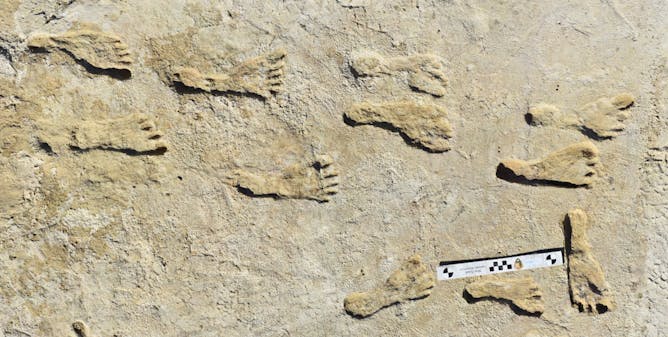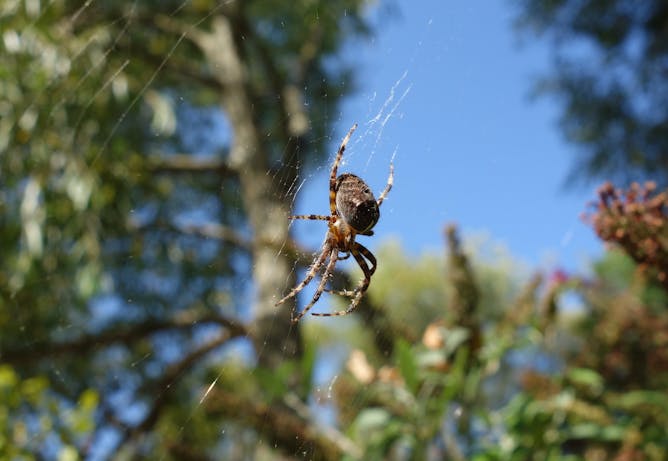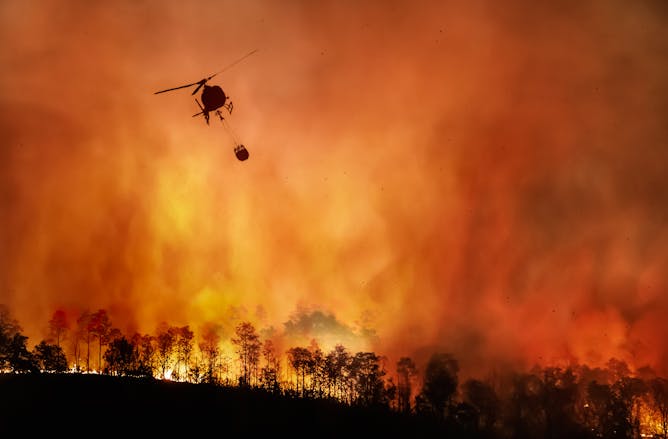|
|
|
|
As epic prehistoric journeys go, it’s hard to look beyond the crossing of the Bering Land Bridge. It’s got the significance: this strip of land, which once connected Asia to Alaska, is responsible for the first human settlement of the Americas. It’s got drama, featuring Pleistocene woman, man and child battling along the Arctic fringe, in the middle of an ice age, in search of food and shelter. And it’s got more than a dash of suspense – because, as the ice around these pioneers began to melt, their precarious land bridge would slowly begin to sink back beneath the sea.
It’s a marvel that Hollywood hasn’t picked it up. But if they had, the script would need updating. For decades, scientists believed humans first set foot in North America around 16,500 years ago, as the last ice age was melting into slush. But a team working in New Mexico has unearthed a set of fossil footprints they’ve shown to be 23,000 years old. Their discovery, as archaeologists involved in the study have shared with us, could rewrite the history of human
migration to the Americas.
It’s not quite ice-age Siberia outside but, with autumn upon us, insects are already making their own miniature migrations into our homes. We’ve heard how they know the season’s changing. And with Germans heading to the polls on
Sunday, an economist explains why the outgoing Angela Merkel leaves behind an economy that, if anything, has underachieved during the 16 years she’s been
chancellor.
Plus check out the latest The Conversation Weekly podcast on how some scientists are beginning to worry they’ve underestimated the speed of climate change.
|

|
Alex King
Commissioning Editor, Science + Technology
|
|

Are these the footprints of the first-known American teen?
Matthew Robert Bennett
Matthew Robert Bennett, Bournemouth University; Sally Christine Reynolds, Bournemouth University
The New Mexico findings could rewrite the history of human migration to the Americas.
|

Angela Merkel 2015 portrait by Colin Davidson.
Raymong Tang
Muhammad Ali Nasir, University of Huddersfield
Germany was steady under its longstanding chancellor, but also stagnant.
|

Spider’s webs have been used as an indicator of winter weather through the ages, but this is not backed up by research.
Charlie Goodall/Shutterstock
Elizabeth Duncan, University of Leeds; Thomas Dally, University of Leeds
Insects are changing their behaviour as they prepare for winter.
|

The latest climate change assessment by scientists is a ‘code red for humanity’, according to the UN.
Toa55/Shutterstock
Gemma Ware, The Conversation; Daniel Merino, The Conversation
How scientists are improving their understanding of the connection between extremes and climate change – and what’s to come. Listen to The Conversation Weekly.
|
Politics + Society
|
-
Charlotte Galpin, University of Birmingham; Maren Rohe, University of Birmingham
Support for Alternative for Germany continues in the former East Germany in particular. It’s worth really asking why.
-
Alim Baluch, University of Bath
Grand coalitions and fragile alliances have become standard procedure in the Bundestag.
-
Robert A. Pape, University of Chicago
A representative survey of American adults finds broader support for violent insurrection than many would like to think.
-
Lisa Hajjar, University of California Santa Barbara
A scholar who has visited Guantanamo 11 times to observe legal proceedings in the 9/11 terrorism case explains why the conflict continues to delay the case going to trial.
-
Kanstantsin Dzehtsiarou, University of Liverpool
The European court of human rights has found the Russian state responsible for Litvinenko’s death by poisoning.
|
|
Health + Medicine
|
-
Laura (Layla) H. Kwong, University of California, Berkeley
Since the coronaviurs first began spreading around the globe, people have debated how effective masks are at preventing COVID-19. A year and a half in, what does the evidence show?
-
Filipa Henderson Sousa, Edinburgh Napier University; Peter Barlow, Edinburgh Napier University
Molnupiravir is showing promise for treating and controlling the spread of COVID-19.
|
|
Arts + Culture
|
-
Christopher Vezza, University of Glasgow
The album cover was inspired by Kurt Cobain’s fascination with underwater births.
|
|
Environment + Energy
|
-
Tom Stacey, Anglia Ruskin University
Electric cars are still more resilient to price shocks than vehicles running on fossil fuels.
|
|
| |
Featured events
|

|
— Online event, Bangor, Gwynedd, LL57 2DG, United Kingdom of Great Britain and Northern Ireland — Bangor University
|

|
— The University of Manchester, Oxford Road, Manchester, Manchester, M139PL, United Kingdom of Great Britain and Northern Ireland — University of Manchester
|

|
— Thomas Paine Study Centre Lecture Theatre, University of East Anglia, Norwich , Norfolk, NR4 7TJ , United Kingdom of Great Britain and Northern Ireland — University of East Anglia
|

|
— Online, Oxford, Oxfordshire, N/A, United Kingdom of Great Britain and Northern Ireland — University of Oxford
|
|
|
|
| |
| |
| |
| |
| |
|
|
|
|
|
|
|